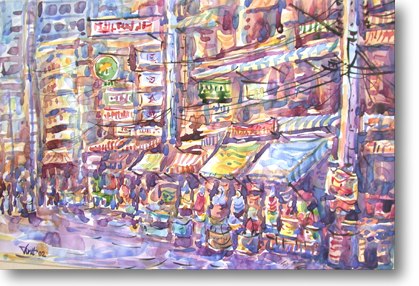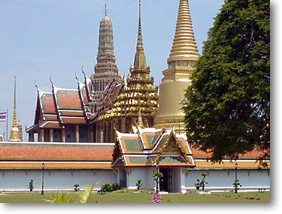The realpolitic curse of recent events.
We have just seen, yet again, how often most Western press, inflame things and so reports the news -at times opposite of reality.
| What happened was more like a "coup de grace", not a coup d'etat. It must be remembered that last time Thailand had such changes, back in 1992, unquestionably one of the country's best prime minister ever was put in place, Khun Anand. |
I remember when Oil prices were at record 76-78 $ a barrel some 1-2 months ago and yet all TV news announcers reported as if it was going 100 US$. Instead of noticing that which is now reality: global economic growth has been tamed and so will oil prices. The end of the US housing boom (apparent already for months) is finally entrenched and so the unsustainable incremental demand has been stopped. For some time it was clear to me that oil prices where much likely to drop then soar further. But then again I have not been a commodity's bull and months ago advocated here to stay away and to remain value investing focus: Thai smaller cap value shares with high dividends are overall the long term overall proven winners.
The past week we saw various critical reports from abroad that supposedly how undesirable a leader and/or how young a democracy is, it must upheld at all cost. As some other wise person just told me. "Democracy does not automatically equate to good government and it is not a "one-size-fits-all" model of government". Many of  us agree that the long term cost to Thailand probably would have been far worse had the recent changes not taken place. The coup led by the military is what the majority of the Thai population had been hoping for as is verified by poll approval ratings of 90 per cent.
us agree that the long term cost to Thailand probably would have been far worse had the recent changes not taken place. The coup led by the military is what the majority of the Thai population had been hoping for as is verified by poll approval ratings of 90 per cent.
Most business leaders see the coup as a positive sign for the Kingdom's long-term economic development, according to a survey by the University of the Thai Chamber of Commerce. About 85 per cent of executives surveyed said they were "very satisfied" with the coup, saying that it would end the confusion in the Kingdom and improve both the political and economic situation. Only 0.3 per cent said they opposed the coup. (Nation Newspaper, September 30 '06).
I surely would not call this a "leap backwards". The military's coup is, indeed, an accomplishment of a goal that could not have been achieved by the people themselves, even in years to come. If this event had not taken place, how much of this country could the Thai's proudly call their own? But enough on that as we here focus on Thai stocks, not Thai politics!
Investors were wise not to bail out, we surely have not.
In the realpolitic curse of events the Baht currency remained relatively stable giving up barely 1% in its value last week vs. the more then 8% rise (against the US$), since the beginning of this year. And the SET index did not budge much and seems to have regrouped its recent firmer tendency. The SET index remains flirting just below 700.
Corruption in Thailand is often the dirty word which outside critics point out. Rightfully so, but not in balance. This by failing to contrast it to true & broader global meaning on this. And when Thailand ousts an overly corrupt leader in order to have new elections & constitution, only then it is viewed with critical Western eyes. I for one am convinced overall high level corruption in Thailand has just been given "a boot in to its bottom". The West of course goes on with business as usual.

It has been well documented that Globalization suffers from a "democratic deficit"* which so tilts much in disfavor on developing countries. Multinational corporations have been at the center of -benefiting from and bringing the benefits- of globalization to the developing world.
In large advanced economies like the US, outright bribery and "corruption" (here is that word again) have been largely replaced by political campaign contributions for changes in policy and regulatory favoritism. The US government has made their interests paramount in international trade negotiations and so often in clear favor of its large political contributors. The Pharmaceutical companies as just one example, spend 760 Million US$ to influence 1,400 congressional bills between 1998 and 2004, 3000 lobbyists work for this industry alone.* The lobbyist influence is not just in getting most favorable (even if unfair) business dealings but on expanded levels as well. Here are just two examples:
How about this Joseph Hazelwood? He was the ship captain of the tanker responsible for the 1989 Exxon Valdes oil spill which did 3 Bill $ worth of environmental damage (the biggest in history), only to get a slap on the wrist: a fine of 51,000 US$ and 1000 hours of community service. Or the Bhopal, India explosion where thousand of people tied and yet the US prevented key executives from being prosecuted for negligence. Oil and the Pharmaceutical/Chemical industry in the US are by far the biggest spending lobbyists.
My point is that third world corruption and first world political campaign contributions are not all that far apart, they both represent a sort of race to the bottom. One is just a cruder expression of the other -and both are to be abhorred upon. Both inflict large damage but in Thailand at least, this was just curtailed by the recent event.
I ask: why should Thailand with a young work force, abundant food & natural resources along with still high average economic growth, besides a persistent high savings rate and now firm currency have its stocks trade at discount multiples to other countries?
Indeed the events of last week will bring on a set of new developments which I believe will bear long term positive inclinations and as expressed last week, are no reasons to reduce exposure. Au contraire.
My model stock portfolios' remain firmly in place and in not too much time we will see, I think, an again upward trending Thai stock market.
Best Regards,
Paul A. Renaud.
* For an excellent book on all this see “Making Globalization work” by Joseph Stiglitz. 2006.

